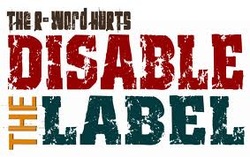 By Samantha Pierce In sociology there is a theory, called the Sapir-Whorf thesis (also known as linguistic relativity) , which claims “people see and understand the world through the cultural lens of language.” (Macionis, 2011)* To put it another way, language creates reality. Since Edward Sapir and Benjamin Whorf first put forth their theories on the relationship between language and reality in the first half of the last century sociologists have come to the conclusion that language doesn’t determine reality in any strict sense. For my part I think our language reflects our reality rather than genuinely creates it. But we still act as if we believe that language creates reality. Consider the terms used to describe people with developmental disabilities. First we had imbeciles, morons, idiots. All originated as clinical terms to describe the developmentally disabled. We now know them as throw away insults used by young and old alike. In the span of a few decades we have seen the term “retarded”, once a clinical descriptor for those with developmental delays, degenerate into an insult so grave that there is a movement to stamp out the use of the word. It’s called the euphemism treadmill where new terms are developed to replace old terms that have come to be seen as derogatory. Even the term “special needs” seems to be taking its turn on the euphemism treadmill for some. All of this brings to me to the person, or people, first language movement. “People-first language is a form of linguistic prescriptivism in English, aiming to avoid perceived and subconscious dehumanization when discussing people with disabilities, as such forming an aspect of disability etiquette.” The idea is basically to name the person first and the descriptor of their condition second. In English we usually do things the other way round. Such tinkering with English sentence structure is seen by some as a good thing for the disabled. It is an effort to create a reality where the personhood of the disabled is valued and respected. In essence it is an attempt to apply the Sapir-Whorf thesis in its language creates reality form. Advocates of person first language claim that we should embrace person first language “To ensure inclusion, freedom, and respect for all.” I agree with some of the sentiments expressed in the above linked article, such as, “The real problem is never a person’s disability, but the attitudes of others! A change in our attitudes leads to changes in our actions. Attitudes drive actions.” But I am more than a bit skeptical that acts of linguistic gymnastics will make any forward movement towards better treatment of and greater respect for the disabled. Unless we work to change attitudes about the disabled within our culture and within our society it’s not going to matter what clumsy, politically correct term is dreamed up next to gloss over the fact that the disabled are greatly devalued in our culture. Person, or people, first language hinges on the idea that a person is a person first and their disability is secondary to their personhood. Now the problem with this kind of thinking is why anyone would think that identifying someone with their disability somehow denies their personhood. Another problem with person first language is that despite the fact that many of the disabled themselves reject the use of person first language and the reasoning behind it other, often nondisabled people, keep pushing for its use. In researching this article I found very few references among supporters of person first language to the opinions of the disabled about person first language (the two references were from Wikipedia and About.com. One can find any number of articles, papers, and blog posts (add this one to that number), some written by the disabled and some not, pointing out the fatal flaws and clumsiness of person first language. Dr. C Edwin Vaughan wrote in his article People-First Language: An Unholy Crusade, I wonder if the proponents of people-first language believe that putting disabled people first on the printed page accomplishes anything in the real world? Does it alter attitudes, professional or otherwise, about disabilities? What is their evidence? The awkwardness of the preferred language calls attention to a person as having some type of "marred identity" (Goffman, 1963). But the misconceptions that diminish the lives of disabled people must still be countered directly. In 1993 Kenneth Jernigan wrote, The Pitfalls of Political Correctness: Euphemisms Excoriated, which was published, and republished, in the Braille Monitor, a journal published by the Nation Federation of the blind. In his article he states, As civilizations decline, they become increasingly concerned with form over substance, particularly with respect to language. Euphemisms and the politically correct language which they exemplify are sometimes only prissy, sometimes ridiculous, and sometimes tiresome. Often, however, they are more than that. At their worst they obscure clear thinking and damage the very people and causes they claim to benefit. The blind have had trouble with euphemisms for as long as anybody can remember, and late twentieth-century America is no exception. The form has changed (in fact, everything is very "politically correct"), but the old notions of inferiority and second-class status still remain. The euphemisms and the political correctness don't help. If anything, they make matters worse since they claim modern thought and new enlightenment. Jernigan further went on to write in a resolution adopted by the National Federation of the Blind, We believe that it is respectable to be blind, and although we have no particular pride in the fact of our blindness, neither do we have any shame in it. To the extent that euphemisms are used to convey any other concept or image, we deplore such use. We can make our own way in the world on equal terms with others, and we intend to do it. In 1999 Joy Johnston wrote of the National Federation of the Blind’s response to person first language, “That one sentiment alone provides the blind community with more empowerment than a thousand politically correct slogans could ever provide.” In the same article we find, What PC [political correctness] proponents fail to understand in their good-hearted mission is that changing the words a person speaks does not change the thoughts in their minds or the feelings in their heart. It's merely a surface solution that does not change the reality of what it is to be a female, a black man, or a disabled person in this society one iota. Stop and consider the following: person with femaleness; person with maleness; person with blackness; person with deafness; person with blindness. All of these characteristics are an intrinsic part of an individual, you can’t separate them from the person. Person first language implies that personhood cannot coexist with disability. It stems from the erroneous assumption that acknowledging the important role that a disability plays in an individual’s life diminishes one’s personhood. What it communicates is the impression that one doesn’t really believe in the disabled individual’s personhood. The proliferation of person first language despite strong opposition to it from the disabled themselves certainly points to the devaluation of the disabled. Clearly “we” think “we” know what is better for “them” than they do never mind what they actually have to say for themselves. I end this article with the able words of Jim Sinclair, an autistic self advocate, Saying "person with autism" suggests that autism is something bad--so bad that it isn't even consistent with being a person. Nobody objects to using adjectives to refer to characteristics of a person that are considered positive or neutral. We talk about left-handed people, not "people with left-handedness," and about athletic or musical people, not about "people with athleticism" or "people with musicality." We might call someone a "blue-eyed person" or a "person with blue eyes," and nobody objects to either descriptor. It is only when someone has decided that the characteristic being referred to is negative that suddenly people want to separate it from the person. I know that autism is not a terrible thing, and that it does not make me any less a person. If other people have trouble remembering that autism doesn't make me any less a person, then that's their problem, not mine. Let them find a way to remind themselves that I'm a person, without trying to define an essential feature of my personhood as something bad. I am autistic because I accept and value myself the way I am. Person first language it isn’t creating a better reality for the disabled. Rather, it is a reflection of the low value we place on the disabled. To use the old cliché, talk is cheap. What we need is action. You can start by listening to what the disabled have to say for themselves. *Macionis, J. J. (2011). Society: the basics. Upper Saddle River: Prentice Hall.
3 Comments
7/7/2015 07:22:31 am
Excuse me, but we are not 'the disabled'. We are disabled people. Have some manners, please!
Reply
Samantha Pierce
7/8/2015 12:46:18 am
Thank you for taking the time to share your opinion here. Your comment is an example of linguistic gymnastics that proves my point. It focuses on word usage, insinuates word choice indicates poor manners on the part of the speaker, but doesn't really address how people actually think about or treat people with disabilities. I use the word disabilities here because I reject the foundational premise of your argument that use of the word demonstrates a lack of manners. I welcome any further comments you may have on the topic of this post which is person first language.
Reply
7/8/2015 11:56:36 am
Except that stating the fact that disabled people are people isn't linguistic gymnastics because the phrase I use puts the identity descriptor first just as it would be in the phrase 'black person', for example. Yet you seem to be arguing that merely adding the word 'person' to the identity descriptor people use about disabled people is 'linguistic gymnastics'. Well, at least I now know how much respect you have for us. Leave a Reply. |
Categories
All
Archives
December 2021
|
Photo from Hayzphotos
 RSS Feed
RSS Feed
